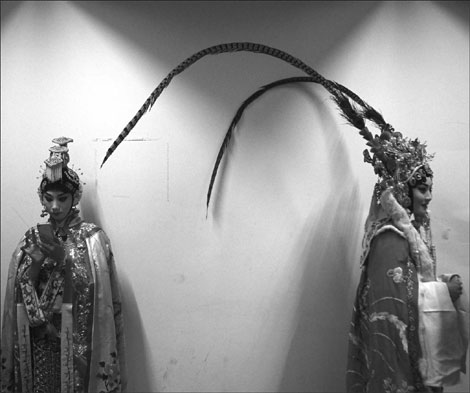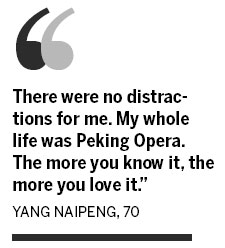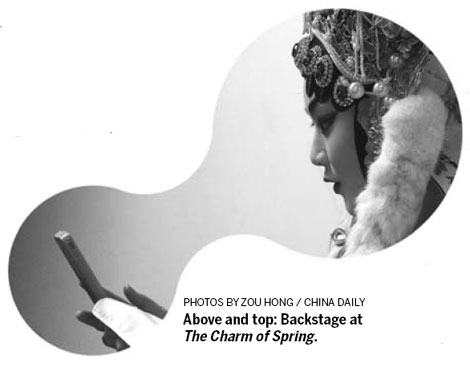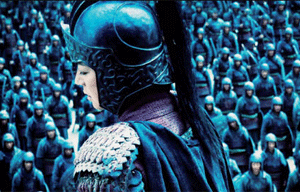Staging a revival
Updated: 2011-10-26 07:56
By Chen Nan (China Daily)
|
|||||||||

The first national competition for up-and-coming Peking Opera stars shows that it's still a much-loved art form. Chen Nan attends the finals.
"Pass me the eyebrow pencil," shouts Lan Gongxin as she prepares for a Peking Opera gala at the capital's National Stadium, in mid-September.
"I look good, right?" the 27-year-old singer asks the makeup artist and then asks her to take a picture on her smart phone. She's dressed in a Hello Kitty T-shirt and is getting her hair done. Behind her, other young Peking Opera performers are going through their makeup routines, putting on their costumes and warming up their voices.
Zhou Enxu, a 21-year-old singer, sits on a wooden box wearing black headphones, listening to some tunes on his iPod while he waits for curtain call.
At 7:30 pm, the gala opens and hundreds of performers from China's major cities take to the stage, armed with lances and swords, to perform elaborately choreographed and acrobatic fight scenes.
There's the clash of cymbals, drums, wooden clappers and a substantial orchestra of Chinese strings and woodwind instruments.
It's a big night for young artists to show off their skills at Beijing Peking Opera Theater's The Charm of Spring talent contest. It's the final of the first ever Peking Opera competition, for which regional selection started in March.
"I am glad there are so many great youngsters to carry on the Peking Opera tradition," says 76-year-old professor Xie Zhaiyong.
"I have listened to Peking Opera every day since I was 20. For me, it's more fun than any TV program," Xie says, while his 7-year-old grandson beside him imitates the swordfights on stage.
When the curtain falls, performers gather backstage to remove their costumes and makeup, discuss each other's performances and joke around.
 |
While many of the youngsters make plans about where to go out and celebrate, Lan Gongxin waits for her husband, Yang Shaopeng, a 35-year-old singer, who won the Best Lao Sheng Award (Peking Opera's older male role) at the gala. They have to get up early the next morning for another round of rehearsals.
Beijing Peking Opera Theater was founded in 1979 and has been the principal stage for many renowned Peking Opera masters, including Ma Liangliang, Tan Fuying and Zhang Junqiu.
Beijing Peking Opera Theater offers a glimpse of what the city used to be like: quiet, with gardens shaded by trees, small storefronts and bicycles. The modest theater in the south of Beijing has long, dark corridors daubed with old slogans like, "One minute on stage represents 10 years of hard work off stage".
"It's old but full of history," says Lan, who was born and raised in Qingdao, Shandong province. She was encouraged by her father to learn Peking Opera and started performing aged 4. She later studied at Qingdao Peking Opera Troupe and then the National Academy of Chinese Theater Arts.
As a dan performer, Lan says she had to do voice training in the early morning, plus basic physical training such as somersaults, splits and handstands.
"I was often tied to a pillar in the classroom for about 40 minutes to do a headstand. Oh my god, I was so scared," she says, her eyes widening at the recollection.
"I love the lyrics of Peking Opera because of the different stories and histories they tell," Lan says. "A few words can vividly depict a person."
Lan's favorite role is Hong Niang, the matchmaker, from Romance of the West Chamber. It was her graduating performance role, after which she joined Beijing Peking Opera Theater, aged 20.
It was here that she met her husband, who comes from a family of Peking Opera performers.
Without his makeup and costume, her husband Yang is handsome and fashionable, dressed in a black T-shirt and blue jeans. Born and raised in Tianjin, Yang's father was a tough teacher.
"He was very strict and beat me," Yang recalls. "I practiced for hours every day and I often cried."
His idea of fun was playing with the swords and practicing kungfu. His childhood dream was to be like Bruce Lee.
"There were lots of Peking Opera masks on the walls of our house. I often wore them and imagined I was in a battle," he says.
Following in his father's footsteps, Yang later joined Beijing Peking Opera Theater.
At rehearsals for Wu Zixu, performed during the National Holiday at Meilanfang Grand Theater, Yang plays the eponymous lead role, a three-hour performance during which he sings and shows off his kungfu skills.
"His performance still needs polishing," says Yang's father, the 70-year-old Peking Opera master Yang Naipeng, who was attending rehearsals. "The eyes, the poses and even a few footsteps need to be more refined. Practice is required."
Yang Naipeng became a Peking Opera student at 4, under the master Yang Baozhong, also a renowned erhu player.
He said there were no schools then and he learned his craft traveling around the country with this teacher. It was an era when there was little other form of entertainment but Peking Opera.
"There were no distractions for me. My whole life was Peking Opera," he says. "The more you know it, the more you love it."
"Nothing represents Chinese culture more than Peking Opera. Everything in it has been carefully thought out and regulated, even the timing when audiences shout hao! (good) after a well-executed movement or song," he says.
His concern is that, like the city's old neighborhoods, Peking Opera will also disappear.
This is partly why Beijing Peking Opera Theater chief Li Enjie initiated The Charm of Spring competition, to promote the art to the masses.
He's comforted that youngsters like Peking Opera, despite new media and other distractions, and notes the theater gives up to 500 performances a year around the country of both classic and new works.
"It's no longer a popular art form, like pop music is right now, but we still get the applause," Li says.












